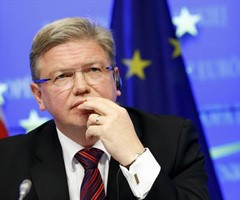|
IN THE SPOTLIGHT |
Eastern Partnership Civil Society Forum
|
|
Eastern Partnership after Vilnius: strategy first of all
‘The Vilnius Summit is continuing in the streets and squares of Kyiv (and other Ukrainian cities)’, said the Commissioner for Enlargement and European Neighbourhood Policy Štefan Füle discussing the situation in Ukraine and the results of the Vilnius Eastern Partnership summit in the plenary of the European Parliament in Strasbourg this week, according to a press release from the Commission. The continuing support of the EU to the modernisation of Ukraine and the readiness to sign the Association Agreement were the main topics raised in his statement and during exchange with the members of European parliament. He also explained the way forward for the Eastern Partnership after the Vilnius summit and underlined the principles and values on which this policy is based, according to a press release says. ‘The massive support for European integration, for reform and modernisation, that has been shown by Ukrainian citizens over recent weeks suggests that a large part of the population has made up its mind about where Ukraine should go, and that Ukrainians are committed to defending their choice by peacefully exercising their civil rights, their freedom of association and freedom of expression’, said the Commissioner. Their voice has been heard. I firmly believe that Ukraine and the European Union have been bound in association – unprecedented by its depth, breadth, and strength – not only by the letter, but by the spirit of this Association Agreement, which is maybe worth a million times more than a simple stroke of the pen. I admire the Ukrainian nation’s love for freedom and the maturity of its European spirit. It is not the European Union's compensation that they seek; it is a chance to live by European values. ‘The Agreement is also a framework for some of the investments that Ukraine will have to make if it is serious about its modernisation pledge. Modernisation and investment go hand-in-hand. There can be no modernisation without genuine effort, political will and adequate investment.’ The speculation we have seen about the alleged cost of Ukraine's modernisation is unfounded and unjustified, as are the trade restrictions imposed by Russia. They are meant to dissuade the Ukrainian people from taking up new opportunities, stressing that ‘in our partnership, we respect and defend the rights and freedoms of each individual, and we must defend the right of every nation to make its own choices. The people of Ukraine, its independence and sovereignty should not become victims of geopolitical zero-sum games or secret agreements’. We are in permanent contact both with government and opposition, as well as civil society to help find a way out of the current political stalemate. That way has to be based on non-violence and on compromises which are conducive to a rapid political and economic stabilisation of the country. This must include a swift and credible investigation into the police brutality on Maidan on the night of 29 to 30 November; a panel with experts from government, opposition and from the Council of Europe will hopefully very soon be formed to monitor these investigations. I call upon the authorities to release all those peaceful demonstrators who remain in custody, the Commissioner said. ‘As President Barroso stated in Vilnius, times of limited sovereignty are over in Europe’, said Commissioner Füle emphasising that Vilnius was an important step in the development and advancement of the Eastern Partnership. ‘Vilnius was the first summit delivering tangible results’, the Commissioner said, based on the steady work on political association and economic integration that the European Union has been doing with partners since the adoption of the Prague Declaration in May 2009 and the Warsaw Declaration of 2011. There are:
‘We also agreed a Joint Summit Declaration which sets ambitious goals to be reached by 2015. Let there be no doubt that respect for our common values will remain at the centre of our partnership: an independent judiciary, tackling corruption and effective and accountable public administration will be essential to ensure agreements serve those for whom they have been negotiated - namely the citizens’. ‘Looking ahead we will intensify our support for broader society – business communities, local and regional authorities, parliaments – and most of all civil society which is vital for building the constituencies for reform. Vilnius has also proven that differentiation is at the heart of the Eastern Partnership: we will be as ambitious as our partners are willing to be and we will deliver to the extent to which our partners are able to deliver on reforms. But combined with greater differentiation is our strong determination to pursue our common agenda with all six partners through multilateral dialogue and cooperation’. ‘The Eastern Partnership is all about creating the conditions that will unlock and fulfil the potential for growth, enterprise, and creativity of citizens in Eastern Europe. The Partnership is being tested by the decision of Ukraine not to sign the AA/DCFTA at this stage. But the European Union has come out stronger because it did not compromise when faced with external pressure, it stood firm. It stands united and keeps the door to finishing the transformation of partner countries, within a clear rules-based framework, firmly open’, he concluded. |
Project funded by the European Union
![]()








